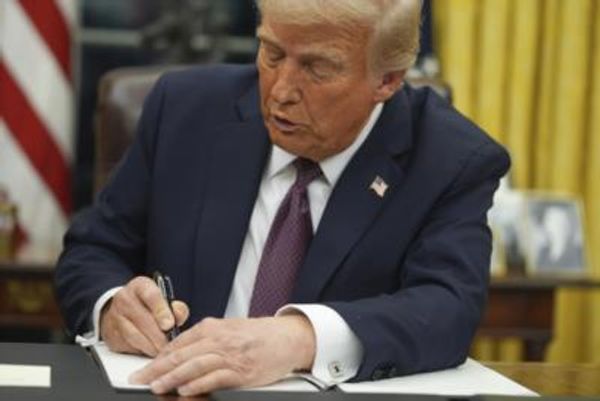Welcome to your weekly explanation of all the big news, strange rules and interesting happenings from the world of US politics.
Make no mistake, Liz Cheney wanted this fight.
Back in February, less than one month after a pro-Trump mob stormed the US Capitol, the daughter of a former vice-president survived a bid to oust her from the Republican leadership.
Back then, she fought to hold on to her job, reportedly making the usual quiet phone calls to shore up her support. But she was unrepentant about the thing that put her at risk.
She told her colleagues she wouldn't apologise for her vote to impeach Donald Trump over his actions leading up to the attack on the Capitol. She kept volunteering criticism of him in interviews and press conferences.
So when the vote to remove her came up again, Cheney didn't just seem uninterested in trying to hold on to her post — she stuck out her chin and goaded her Republican colleagues to do their worst.
It might seem like Cheney is on the canvas for good after the knockout punch finally landed, much to the glee of the brawl's promoter in Mar-A-Lago. But don't lose sight of the bigger picture.
Cheney certainly hasn't.
In the hours after her ousting, Cheney had already lined up an interview with NBC's Savannah Guthrie (of whom Trump is no fan of after the two sparred during a town hall in the 2020 election).
A high-profile sit down with Fox News's Bret Baier was next.
As plenty of seasoned watchers noted, a new national spotlight might make Cheney more influential now than she ever was within the Republican leadership.
She's snagged the bully pulpit just a week after Trump lost his own chance to get it back; Facebook's Oversight Board is keeping him off the platform (for a little while longer, at least).
The Lincoln Project — which raised a whopping $US90 million during the 2020 election cycle — showed what an anti-Trump conservative voice can do.
Setting aside the earnestness of Cheney's belief that Trump will bring about the downfall of the Republican Party, it's clear that right now she's made one heck of a gamble — that Trump is a fading force in American politics.
Cheney was reportedly alarmed in April when she discovered that polling showing Trump's rapidly declining popularity in battleground districts had been left out of a presentation to members at a Republican retreat.
She said this week was just the "opening salvo" in her plan to oust Trump from the Republican party … and perhaps position herself as the alternative if she succeeds.
New York Representative Elise Stefanik is certain to be the replacement for Cheney based not on her conservative credentials (which fringe Republicans have already begun questioning) but purely for her fealty to Trump.
That's a gamble Stefanik successfully made herself back in 2019, when she transformed from a moderate Republican to a very public defender of the former president. It won her a national profile, and now perhaps a seat almost at the top echelons of the Republican Party.
That act of seeking Trump's blessing further cements its perceived power even in the face of evidence that it might be fading. But it's a fickle thing.
Just ask Michael Cohen. Or Jeff Sessions. Or Bill Barr. Or Mike Pence. Or even the now-former number three House Republican who voted to support Trump's agenda 92.9 per cent of the time.
The reopening
Americans as young as 12 started getting the jab this week, after US regulators authorised the Pfizer vaccine as safe for older children.
It's a critical step for reopening schools, and comes as America's vaccination rate amongst adults is starting to slow drastically.
Roughly 47 per cent of the population has received at least the first dose, but polling shows there's still considerable hesitation, especially among rural Americans and Republicans.
America's top disease expert, Dr Anthony Fauci, estimated that 70 to 85 per cent of the country needs to get fully vaccinated to achieve herd immunity. Headline after headline predicts the US just may not get there.
With access and supply no longer issues, experts chalk up the hesitation to anxiety over side-effects, scepticism about efficacy and an overall lack of urgency now that the economy is reopening.
But if you ask the politicians, the hesitation stems from a lack of free stuff. Or at least that's the impression you'd get judging by all the incentives being offered to vaccinated Americans — free beer, donuts, french fries, lottery tickets, university scholarships, just to name a few.
It's silly, yes, but it's also a little scary. The US has lost more than 575,000 lives to COVID-19.
Election fever
Last week we told you about the weirdest election of 2021. This week there was a development in the highest profile one — the race to be the next mayor of New York.
There'll be Republican and Democratic primaries held at the end of June, then a general election between the two winning candidates in early November.
The person leading the Democratic field is a name you might be familiar with — former Democratic nominee Andrew Yang.
Don't forget, Yang's primary campaign lasted longer than a LONG LIST of Democratic stars… including the current vice-president.
This week, a New York Times endorsement of longtime New York public servant Kathryn Garcia raised eyebrows.
Only two years ago, in its much-derided double endorsement of Amy Klobuchar and Elizabeth Warren for Democratic nominee, the Times had this to say (emphasis ours):
Breaking the internet
One of the first promises made by White House press secretary Jen Psaki was that when the Biden's adopted a cat, it would "break the internet".
Since then, it's been a little quiet on the feline front, while one of the Biden's dogs, Major, has attracted some …ruff … headlines (sorry).
Well, now we've got an update on the cat, courtesy of the First Lady. In an interview with NBC, Jill Biden said the cat, a female, is "waiting in the wings".
She also revealed that while he was away from the White House recently, Major spent time in a shelter getting familiar with cats.
Asked if adopting the cat was his idea, the President flatly answered "no," basically breaking his promise to bridge divided Americans by revealing himself as a dog person.







